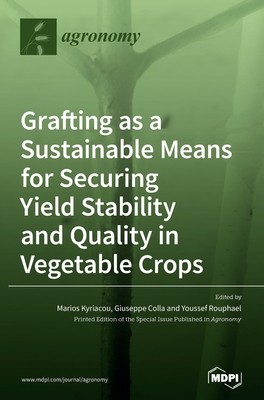
- We will send in 10–14 business days.
- Publisher: MDPI AG
- ISBN-10: 3036503927
- ISBN-13: 9783036503929
- Format: 17 x 24.4 x 2.1 cm, kieti viršeliai
- Language: English
- SAVE -10% with code: EXTRA
Grafting as a Sustainable Means for Securing Yield Stability and Quality in Vegetable Crops (e-book) (used book) | bookbook.eu
Reviews
Description
Vegetable growers around the world only collect, on average, half of the yield they would obtain under optimal conditions, known as yield potential. It is estimated that 60-70% of the yield gap is attributable to abiotic factors such as salinity, drought, suboptimal temperatures, nutritional deficiencies, flooding, waterlogging, heavy metals contamination, adverse soil pH and organic pollutants, while the remaining 30-40% is due to biotic factors, especially soilborne pathogens, foliar pathogens, arthropods and weeds. Under climate change forecasts, the pressure of biotic/abiotic stressors on yield is expected to rise and challenge further global food security. To meet global demand, several solutions have been proposed, focusing on the breeding of varieties with greater yield potential, but this one-size-fits-all solution leads to limited benefits. In order to overcome the current situation, grafting of elite scion varieties onto vigorous rootstock varieties has been suggested as one of the most promising drives towards further yield stability. Specifically, the implementation of suitable rootstock à scion à environment combinations in Solanaceous (tomato, eggplant, pepper) and Cucurbitaceous (melon, watermelon, melon) high-value crops represents an untapped opportunity to secure yield stability and reliability under biotic/abiotic stresses. This Special Issue invites Original Research, Technology Reports, Methods, Opinions, Perspectives, Invited Reviews and Mini Reviews dissecting grafting as a sustainable agro technology for enhancing tolerance to abiotic stresses and reducing disease damage. In addition, the following are of interest: potential contributions dealing with genetic resources for rootstock breeding, practices and technologies of rootstock breeding, and rootstock-scion signaling, as well as the physiological and molecular mechanisms underlying graft compatibility. In addition, the effect of grafting on vegetable quality, practical applications and nursery management of grafted seedlings and specialty crops (e.g. artichoke and bean) will be considered within the general scope of the Special Issue. We highly believe that this compilation of high standard scientific papers on the principles and practices of vegetable grafting will foster discussions within this important field.
EXTRA 10 % discount with code: EXTRA
The promotion ends in 21d.09:09:38
The discount code is valid when purchasing from 10 €. Discounts do not stack.
- Publisher: MDPI AG
- ISBN-10: 3036503927
- ISBN-13: 9783036503929
- Format: 17 x 24.4 x 2.1 cm, kieti viršeliai
- Language: English English
Vegetable growers around the world only collect, on average, half of the yield they would obtain under optimal conditions, known as yield potential. It is estimated that 60-70% of the yield gap is attributable to abiotic factors such as salinity, drought, suboptimal temperatures, nutritional deficiencies, flooding, waterlogging, heavy metals contamination, adverse soil pH and organic pollutants, while the remaining 30-40% is due to biotic factors, especially soilborne pathogens, foliar pathogens, arthropods and weeds. Under climate change forecasts, the pressure of biotic/abiotic stressors on yield is expected to rise and challenge further global food security. To meet global demand, several solutions have been proposed, focusing on the breeding of varieties with greater yield potential, but this one-size-fits-all solution leads to limited benefits. In order to overcome the current situation, grafting of elite scion varieties onto vigorous rootstock varieties has been suggested as one of the most promising drives towards further yield stability. Specifically, the implementation of suitable rootstock à scion à environment combinations in Solanaceous (tomato, eggplant, pepper) and Cucurbitaceous (melon, watermelon, melon) high-value crops represents an untapped opportunity to secure yield stability and reliability under biotic/abiotic stresses. This Special Issue invites Original Research, Technology Reports, Methods, Opinions, Perspectives, Invited Reviews and Mini Reviews dissecting grafting as a sustainable agro technology for enhancing tolerance to abiotic stresses and reducing disease damage. In addition, the following are of interest: potential contributions dealing with genetic resources for rootstock breeding, practices and technologies of rootstock breeding, and rootstock-scion signaling, as well as the physiological and molecular mechanisms underlying graft compatibility. In addition, the effect of grafting on vegetable quality, practical applications and nursery management of grafted seedlings and specialty crops (e.g. artichoke and bean) will be considered within the general scope of the Special Issue. We highly believe that this compilation of high standard scientific papers on the principles and practices of vegetable grafting will foster discussions within this important field.


Reviews